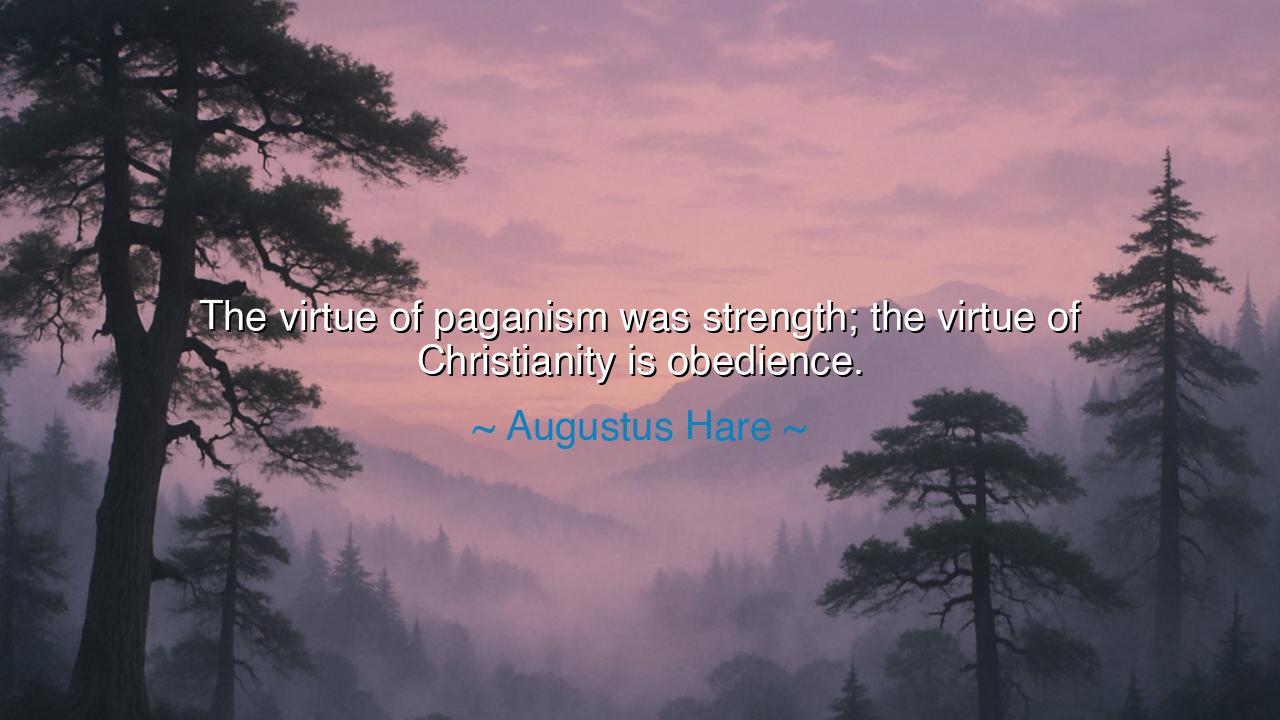
The virtue of paganism was strength; the virtue of Christianity






Hearken, O seekers of wisdom, to the words of Augustus Hare, who declared: “The virtue of paganism was strength; the virtue of Christianity is obedience.” In this contrast he reveals the shifting soul of civilizations. For every age fashions its guiding virtue, and each virtue molds the spirit of its people. To the ancients who worshiped many gods, the highest good was strength—to conquer, to endure, to rise above adversaries. But with the coming of Christianity, the central virtue became obedience—to surrender the will to God, to bow before divine authority, and to follow the path of humility and faith.
The origin of this saying lies in the transformation of the West. In the days of Rome and Greece, strength was the ideal: the strength of the warrior in battle, the strength of the athlete in the games, the strength of the orator in the assembly. Gods such as Zeus, Mars, and Athena embodied force, power, and victory. Yet, as the Christian faith spread across the empire, a new message arose: blessed are the meek, the merciful, the pure of heart. The crucified Christ did not conquer by sword but by sacrifice, not by force but by submission to the Father’s will. Thus the world’s axis shifted—from glory in strength to sanctity in obedience.
Consider the deeper meaning. Strength, as celebrated by paganism, is the power to bend the world to one’s will. It is bold, external, visible. But obedience, as taught by Christianity, is the discipline to bend one’s will to something greater—to God, to love, to righteousness. It is inward, unseen, yet no less demanding. To be strong outwardly requires courage of the body; to be obedient inwardly requires courage of the soul. Hare’s words remind us that true virtue depends on the age’s vision of what humanity must serve.
History bears witness. The Roman gladiator’s valor was praised in arenas, where strength alone was the measure of worth. But centuries later, Saint Francis of Assisi, clothed in rags, renouncing wealth, and living in obedience to the Gospel, was seen as the model of holiness. The transformation was total: from honoring the might of the body to honoring the surrender of the will. Each figure reflects the virtue of their age—one lauded for power, the other revered for submission to the divine.
Emotionally, Hare’s words stir us because they unveil a paradox. In strength there is pride, yet in obedience there is humility. Strength seeks to command the world; obedience seeks to serve it. And yet, both are forms of greatness, for one shapes the outer order of society while the other shapes the inner order of the soul. The tragedy of history is when either is exalted without balance—for unchecked strength breeds tyranny, and blind obedience breeds oppression.
The lesson is this: honor both strength and obedience, but in their rightful places. Be strong in character, in conviction, and in perseverance, yet obedient to truth, conscience, and the divine will. Let your strength protect, not oppress. Let your obedience elevate, not enslave. For the fullness of virtue lies not in choosing one against the other, but in harmonizing both.
O seeker of wisdom, take this teaching into your life. Ask yourself: where must I be strong, and where must I yield? In the trials of the body, cultivate strength; in the trials of the spirit, cultivate obedience. In this way, you carry both the legacy of the ancients and the wisdom of the faithful, uniting two great traditions into one.
Finally, let this truth endure across ages: civilizations rise by their virtues, and virtues shape the destiny of mankind. As Augustus Hare proclaimed, strength was the crown of the pagans, obedience the treasure of the Christians. Let us walk wisely, balancing both, so that we may not fall to pride nor to servitude, but rise into harmony with the eternal.






AAdministratorAdministrator
Welcome, honored guests. Please leave a comment, we will respond soon